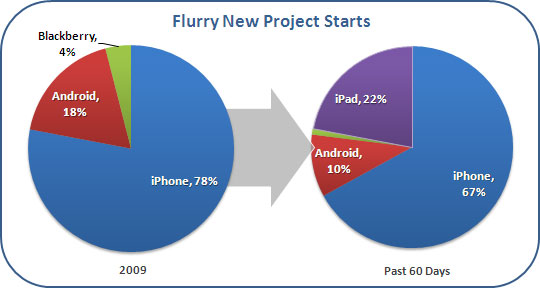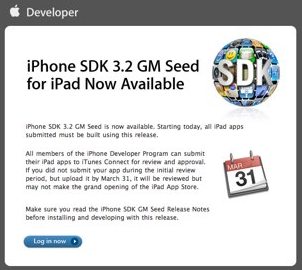Apps for Apple iPad command 22% of new mobile projects
In the two months since the iPad was announced, the still-unreleased platform has generated more interest from developers than the Android and BlackBerry platforms combined, according to a new study.
Over the last 60 days, new project starts tracked by mobile analytics firm Flurry show that the iPad has carved out a 22 percent share, well ahead of Android, which has 10 percent, and behind only the iPhone at 67 percent.
"As April 3 draws near, developers continue to develop for the iPad at a fever pitch," the company said.
Flurry has counted about 2,000 iPad applications already listed in the App Store, before the device has even been released. Consumers will get their hands on Apple’s latest hardware this Saturday.
On average in 2009, Android accounted for 18 percent of software development, while the iPhone commanded 78 percent. Similarly, though BlackBerry took 4 percent of application development in 2009, it has represented just 1 percent in the last 60 days.
In March alone, of over 3,000 unique applications created within the Flurry network, Android’s share of new project starts decreased to just 8 percent.
"However, it should not be concluded that Android developer support is on the decline," the analytics firm said. In fact, the opposite is true, as we count approximately 300 new Android projects in March, which represents a 50% increase over February.
"Android’s percent has declined because iPhone and iPad growth is increasing at a rate faster than that of Android. In short, more developers are building more apps. The total pie is growing significantly, month over month."

Last month, Flurry revealed that startup developers represent one in five on their network. With more than 150,000 applications available on the App Store, and most of them compatible with the forthcoming iPad, the firm found that the digital download destination is a place where independent software creators have a fair shot at success.
In February, Flurry reported that App Store developer interest had nearly tripled following the unveiling of the iPad. The trend has continued in the latest report, with a "significant increase" in new application starts maintained through the month of February.
Apple has pitched the launch of the iPad as a "whole new gold rush" for developers, as the device and its 9.7-inch screen will run existing App Store software as well as new applications designed specifically for the hardware and its larger touchscreen. First released in January, the iPhone 3.2 beta software development kit allows developers to create iPad-specific software.
Apple Releases iPad 3.2 SDK Gold Master and Firmware

The iPad Software Development Kit (SDK) has now been stripped of its beta status as Apple released the gold master version of the development software today.
iPad SDK 3.2 GM is the new release that all iPad applications must be built on in order for inclusion in the App Store from this point forward.
In an email sent to developers, Apple states, "All members of the iPhone Developer Program can submit their iPad apps to iTunes Connect for review and approval. If you did not submit your app during the initial review period, but upload it by March 31, it will be reviewed but may not make the grand opening of the iPad App Store."
MacRumors notes that Apple has also just posted the iPad 3.2 Firmware (download link) on their servers. Of course, if you do download it, there’s nothing much you can do since only a select few in the world have iPads (hrm... someone with the lucky last name of "Jobs").
Also of interest is the iPad documentation file (download link) that provides this very interesting statement:
"Apple will provide you any iPad OS software updates that it may release from time to time, up to and including the next major iPad OS software release following the version of iPad OS software that originally shipped from Apple on your iPad, for free. For example, if your iPad originally shipped with iPad 3.x software, Apple would provide you with any iPad OS software updates it might release up to and including the iPad 4.x software release. Such updates and releases may not necessarily include all of the new software features that Apple releases for newer iPad models."
MacRumors notes that this could mean a free upgrade to the 4.x software, but paid upgrades beyond that. Somewhere in the middle of the iPhone and iPod touch upgrade paths.
In addition to all of the news above, Apple has also posted a page on their developer site where developers can learn all about submitting their iPad applications to the App Store.
Future Apple’s iPad OS Upgrade Pricing Policies Revealed as Apple Seeds GM iPad SDK, Firmware and Licensing Agreement
Apple has begun seeding the Golden Master version of the iPhone OS 3.2 SDK to developers. This represents the shipping version of the software that developers must use to develop iPad applications. Meanwhile, Apple has also simultaneously posted two new files to their servers including the iPad licensing agreement and iPad 3.2 Firmware:
- iPadDocumentation_3.2.ipd
- iPad1,1_3.2_7B367_Restore.ipsw
The firmware file (download link) carries a final build number of 7B367 but is of little use at this time without an iPad to install it on. The iPad Documentation file simply provides the end-user licensing agreement for the iPad software.
The iPad licensing software provides the usual legal documentation for use of Apple’s software, Google Maps and YouTube videos, but also reveals one interesting aspect of Apple’s plans for iPad OS updates:
Apple will provide you any iPad OS software updates that it may release from time to time, up to and including the next major iPad OS software release following the version of iPad OS software that originally shipped from Apple on your iPad, for free. For example, if your iPad originally shipped with iPad 3.x software, Apple would provide you with any iPad OS software updates it might release up to and including the iPad 4.x software release. Such updates and releases may not necessarily include all of the new software features that Apple releases for newer iPad models.
Current iPod Touch owners have had to pay for each major OS software update, while iPhone owners have received their updates for free. The reasoning behind this policy has been blamed on legal accounting requirements.
It appears iPad owners will fall somewhere in the middle. iPad owners will receive the next major OS update (4.x in the case of new iPad owners) for free, but may have to pay for the next major upgrade (5.x).
Beta Test Steam and Team Fortress 2 for Mac

Want to play Team Fortress 2, Half-Life, Counterstrike, and some of the other sweet Valve games on your Mac? Apply to be an official beta tester for the upcoming Mac version of Steam. It’s a simple questionnaire that goes through your computing setup and gaming habits, and then you provide a copy of your System Profile information. Beyond randomness (or luck), it seems who gets chosen to download the beta client is based on Valve’s hardware testing needs.
A user on TUAW claims to have applied and received a very quick response with an approval, writing the following in the comments:
Wow..that was quick…I just entered my application and they emailed me back code to get mac version of steam client….within hours of entering !! this is like christmas..I’m going to test out some team fortress !!
Why not give it a go yourself? Head on over to Steam’s Mac beta signup site:
You’ll need a Steam login to apply, which suggests a preference to those who already own and use Steam, ie: PC & Mac users.
Apple rumored to introduce iAd App Store service on April 7th
Apple’s plan to muscle its way into the mobile advertising market in a direct challenge to Google could come as early as next month in the form of a service dubbed "iAd," according to a published but vague report on the matter.
Citing an unnamed executive familiar with the plans, MediaPost claims that Apple chief executive Steve Jobs has been touting the upcoming service, rumored to launch April 7th, as "revolutionary" and "our next big thing" amongst his inner circle. No further details were reported.
Still, it’s expected that the service will leverage assets and personnel acquired by the iPhone maker in its January buyout of mobile advertising firm Quattro Wireless for $275 million. The acquisition came on the heels of a $750 million purchase of rival mobile ad firm AdMob by Google, which reportedly outbid Apple on the deal.
When asked about the company’s acquisitions of Quattro and the Lala music service during the company’s first quarter earnings conference call, Apple’s chief financial officer Peter Openheimer said, "In terms of Quattro and Lala we acquired Quattro because we wanted to offer a seamless way for developers to make more money on their apps, especially free apps. We acquire companies from time to time for their technology and talent, that’s why we do it."
Apple has never run an ad business before, but it has also never really had a captive platform to sell any advertising before either. The company briefly flirted with adding banner ads to its Sherlock search app a decade ago before abandoning the idea. Since then, it has focused on selling its own applications and its iTunes media partners’ content as ad-free rather than chasing the idea of ad-supported media models.
This, however, enabled Google to remain focused on creating an open source smartphone monoculture around its own Android mobile operating system that would allow it to track and target mobile users with advertising. The search giant’s goal is to expand its advertising monopoly into mobile devices and become the next Microsoft of smartphones, except that it will be collecting revenues for ads and paid search results rather than licensing software as Microsoft had.
For its part, Apple operates the world’s fastest growing mobile platform and retains a tight relationship with its iPhone developers, who can currently only publish their apps through iTunes. By offering these software makers integrated advertising services, its believed that Apple can get started in the mobile ad business and quickly catch up with Google’s own fledgeling mobile efforts.
In a report published back in January, people close to Apple’s Jobs said the company co-founder hoped to "overhaul mobile advertising in the same way they had revolutionized music players and phones." Details were again scarce, but it was speculated that Apple could rely on user data collected through iTunes and the App Store, along with geo-location technology due to GPS in the iPhone, to create targeted, local advertisements that would be more relevant to consumers. The company could also utilize gimmicks, such as having users shake their iPhone to win a prize.
"Some developers have profited by embedding ads in their apps, but the payments tend to be insignificant since the ads are usually smaller, less effective versions of their Web banner forms," the report said. "According to a source familiar with his thinking, Jobs has recognized that ’mobile ads suck’ and that improving that situation will make Apple even harder to beat."
"Apple has a vault of valuable data that can help drive an ad business," the report added. "It knows precisely which apps, podcasts, videos, and songs people download from iTunes; in many cases it has detailed customer information such as credit-card numbers and home addresses. That gives Apple a chance to blend advertising and e-commerce in new ways, particularly after the acquisition of Quattro."
For Apple, the market and opportunity already exists, which should allow the company to focus primarily on execution. As of 2007, the company said it had more than 500 million active iTunes Store account holders, a figure which has surely grown substantially since then. It’s bounty? A mobile online advertising market worth $2 billion annually and growing.